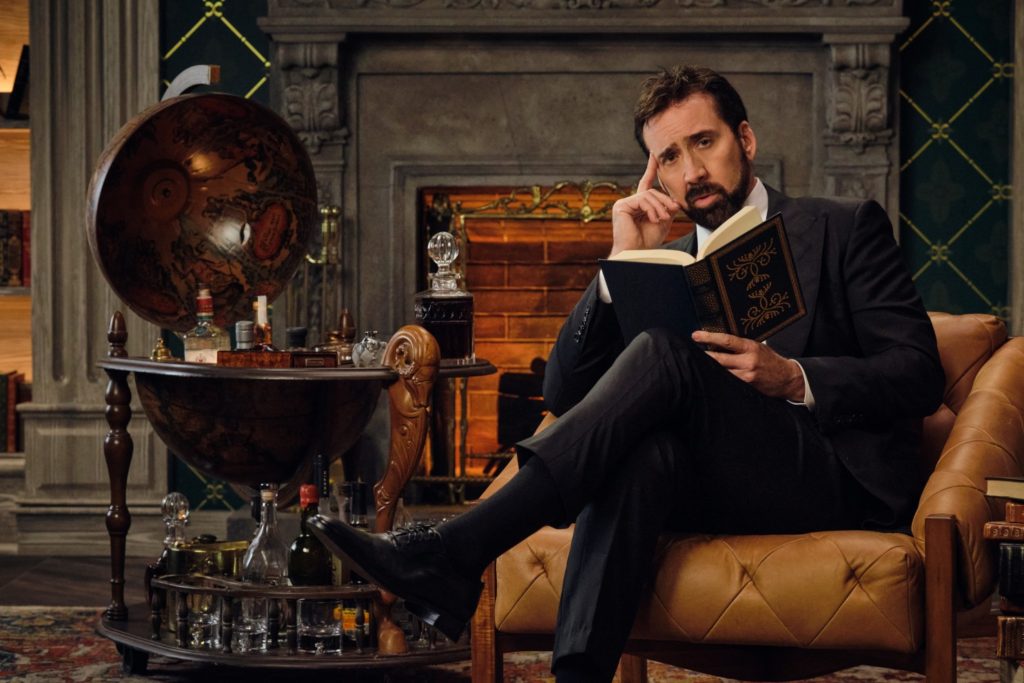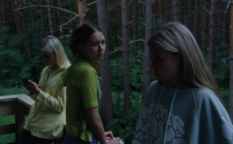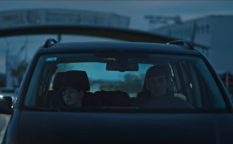Reflections 12

Reading various end of year online polls, it seems to me that not only did I not go to the cinema for most of 2020, but I missed entirely the films others were watching at home. I’ve barely seen half of the overall top ranked 50 films from Sight & Sound’s poll, even though I participated in it. I am struck by feelings of guilt and shame for not watching enough, not watching better – as if watching films were a competitive sport. I’ve been benched for a long time now. I wish I had the bravery of Elena Gorfinkel, to sit confidently outside of such lists. To stand up for art. As I re-read Against Lists, I think about all of the ways that I experience FOMO and all of the ways that I want to stop.
I’ve deleted the Facebook and Twitter apps from my phone. I can still check the platforms on my laptop, but I’m trying not to. I want to break a habit that I have so willingly allowed to colonise my time and attention. In 2009, Twitter was where I ‘met’ many now friends from the film ‘community’ (including my partner), and where I found new places to read and engage with film culture. Now, with an exclusory label, “Film Twitter” is a place where critics go to publicly shame and invalidate other critics, to out-list them, and, if they can, to do it first.
I have lost my cine-compass in all of this. Where do I go to engage and to discover? Everything is an app and all are ruled by algorithms that seem to want me to disappear. Festivals and cinemas are trying to step into that space online, to provide programmes and recommendations, inevitably more lists. But the best thing I’ve seen in the gulf between my last column and this tardy entry into the reflective pond of my passion was something a friend recommended to me. Warwick Thornton’s The Beach is not on my ballot for S&S’s Best Television Series of 2020, because I hadn’t seen it yet. Still, when I eventually did watch it, it spoke to me far more directly than any of the shows that are.
It’s easy to allow directors whose work we admire to become legends in our minds. But, no matter how talented, they are and always will be people. One of the many delights in Thornton’s isolation-performance-cum-cooking-show is in seeing and hearing Thornton, the person. His conversations with his chooks are among some of the most honest that television in 2020 captured on camera. Though I have never been to the absolutely stunning Jilirr, on the Dampier Peninsula in Western Australia, I have seen natural beauty of that magnitude in my life, growing up in Aus. For it, I am deeply homesick. More so, however, for the naturally comfortable honest speak, delightfully lyrical intonation, and glorious casual swearing that Thornton abounds; it was like hearing the language of my soul for the first time in a long time. Language, I realise – linguistic, visual, or otherwise – is not something I can list or even surmise at the end of a calendar year. It is living and, as such, cannot be measured, but should speak and be understood.
It was that same friend who recommended this show who was also made redundant from the cultural institution we both formerly worked for, during the summer of our pandemic. What a loss, I think, wondering why no one who still has their job recommended anything nearly as good for me to watch through the many months of depression and anxiety, and silence against the oppression of attempting to watch endless lists of FOMO from home.
Reaching the end of 2020 felt anticlimactic – even our most anticipated terrestrial TV treats were already half-eaten. Charlie Brooker’s Antiviral Wipe, ruminating on the absurdity of the UK’s handling of the global pandemic was every bit as acerbic and entertaining as I could have asked. But we watched it during the original lockdown. With our third iteration of staying at home on the horizon, we needed more media critical entertainment, and fast. As our great algorithmic visual vulture knows, picking at the bones of a good idea will produce, at best, a hit show and, at worst, a high-rating, subscriber-driving dud: win-win. And so, my New Year’s Eve was sponsored (as so many nights in 2021 are bound to be) by Netflix with Death to 2020, a not-quite movie-length, tele-special packed full of celebrities and fuelled by a strange mix of cynicism and dad jokes. Presumably, with little else to review but with so much cyberspace to fill, the reviews of this one are both plentiful and enthusiastically scathing. So many writers could not wait to lay into it, lambasting its lack of artistry as if it owed us anything other than filling its runtime with sounds and images. It’s not even compelled to take up airtime, it just has to exist so it can be coded into its advertising space.
I resolve for the ‘new’ year – calendars come and go but time is ever-present and continuous in a way that ‘new’ will never understand – to liberate myself from being measured. I am a person, not a volume. And yet, everything my experience in the arts has taught me amounts to little more than the Sisyphean feat of contently trying and not quite managing to measure the inherently immeasurable aesthetic, tone, and affect of the language of moving images. Repackaging those immeasurable measurements into endless documents to present to funders to justify the time spent so doing is an active feedback loop not an activity of any merit.
Measures such as these and the soon to be upcoming awards that sweep our industry are all interested in finding some measure of success, the very structure and status that art seeks or ought to seek to ignore, protest, disrupt. But status follows us as we push that rock up that hill. It whispers in our ear when we want to stop and think, to reflect, to look back at where we’ve come from and to contemplate where we are going. It tells us to put our heads down and plough on. It wants to us to seek success, even if we are destined to fall, knowing that the feedback loop will force us to, happily, haplessly, start again.
I have spent years in search of that success – wanting to be approved or accepted into the industry of the art form I adore. But acceptance isn’t all it’s cracked up to be. Sure, it comes with a paycheck, but what’s the price? No more autonomy of thought, no time to reflect, no space for critical engagement and, worse still, no strong moral line. I’ve just joined the Critics’ Circle in the UK, but I can’t sign its Critics’ Code because I do, sometimes, write/work for free. I have for years. The industry all but demands it, especially when I want to say or do things that don’t fit house style, tick boxes or funding guidelines. Somewhere, someone shouting on social media about “real critics” is also making a living (probably), as they look down and push with all their “irreverent” linguistic might. Maybe they can acquire a new word or two from another of Netflix’s stonkingly celeb-tastic timewasters, History of Swear Words. Hosted by Nic Cage, and all about curse words, it appeals to at least two of my top five interests, but is, almost entirely, except for a few infographics, celebrity (and linguistic specialist) talking heads discussing the etymology and contemporary usage of our key swears. Cage outperforms his role, as you might expect, saying each swear with the relish of an actor and a linguist, breathing semiotics.

From a Cage of profanity to an opinion on everything, Netflix is offering actual catharsis to its viewers in 2021. Fran Lebowitz is the subject and star of Martin Scorsese’s Pretend It’s a City, where Lebowitz talks about everything that irritates her in NYC. The series is refreshingly angry – an emotion I’m sure I’m not alone in not knowing what to do with in 2020 – and the greatest joy of all is that, because it’s directed by Scorsese, you can’t skip the credit sequence. And because it’s Scorsese, the first episode ends with archive footage New York 1911, restored by MoMA. Space – for people, anger, credits – felt scarce this past year and, as IFFR looms (not only my favourite city and festival to attend, but also the last film festival I actual did), watching a docu-series about NYC (the last place I took a non-film festival related holiday), with images of millions of people navigating communal space feels both absurd and wonderfully nostalgic.
Out in Jilirr, Thornton is responsible to himself and his chooks. He has the Earth and its elements to submit to (admittedly as well as his crew, including his son, Dylan River, who shot the series). But he has, in his shack, cooking crazy amazing food, what we all ought to have, even as he speaks the language of the coloniser: a deep, unwavering sense of self. He takes however long he takes to tell a story, catch a crab, or artfully arrange his food. He speaks with honesty and doesn’t give as many fucks as he speaks. It’s a thing of rare beauty, as sincere as it is stunning, and for that it made my cine-heart swell. Fuck lists, fuck social media, and fuck all of the colonising forces in our otherwise artistic lives (including those who would stop us from swearing – it is an Australianism I don’t want to curtail), from the literal colonisation of the country I used to live in by the one I now live in (no longer European, and barely United), to the colonisation of our thoughts, space, selves, time, by social media, institutions, acronyms and algorithms.
My advice and energy entering into 2021 is to watch whatever the fuck you want to watch, and for fuck’s sake, let it simmer.

















2021-01-13 @ 07:39
Perhaps, within the anger, frustration, dislocation of 2020’s confinement, lurks the subliminal awareness that the medium itself has changed. No longer larger-than-life on a huge screen, in a darkened space with a collection of strangers, experiencing what amounts to dreams and myths, greater than oneself, yet peaceful with strangers. The medium has changed, smaller than life, subject to the starts, stops, edits of the remote. Narrative remains, but the artist is no longer “sculpting in time” — it is the viewer now sculpting the time. No longer in a darkened place do we tacitly hand ourselves over to the experience shaped for us …take the plunge … risk the moment. In the online digital flow, we control the experience on the shrunken screen, no longer risking the filmic journey, nor the strangers in the room. The medium is the message.
Kirk Tougas – Vancouver – Canada
2021-01-16 @ 08:23
Unfortunately theaters long ago stopped being areas where one could give oneself over fully to the experience of a film unfolding. A darkened quiet theater room where people conversed in whispers in the lead up to the previews gave way to a bombardment of loud distressing advertising years ago. Which is really a good foreshadowing of the assault on the senses that one’s fellow theater goers will enact once the actual film begins. What was once a quiet sinking darkness has long since disappeared, now pierced every few minutes by people’s cell phone screens lighting up, text chimes, ring tones, talking and general refusal to give over any degree of silence the film’s aural presence. You compare the home experience in lesser terms to a theater – one in which the individual breaks up the experience of the film via the remote – but at least that’s in the hands of the individual to make the experience what they will. If it’s in fits of discomfiture that’s their own doing – it can just as easily be a deep and meditative experience if they make it that – in a private environment that’s shaped by each viewer rather than a collection of viewers who may or may not be there with the patience to experience the film without interruption.